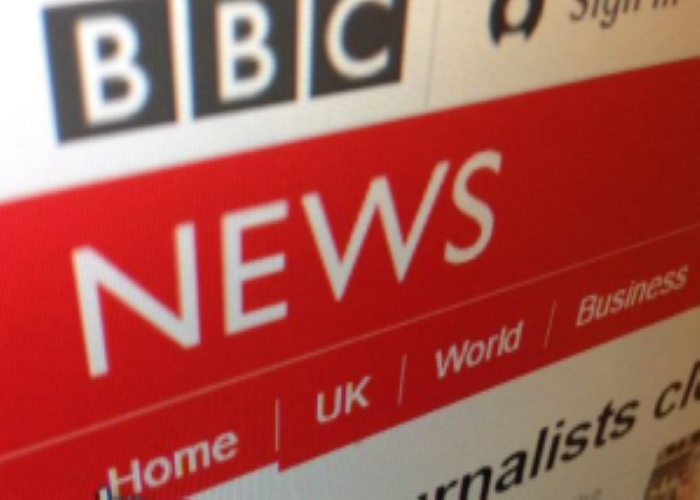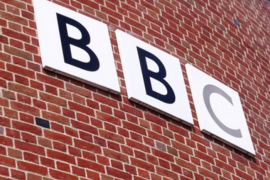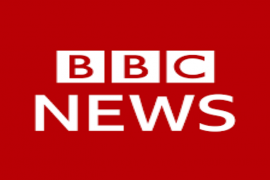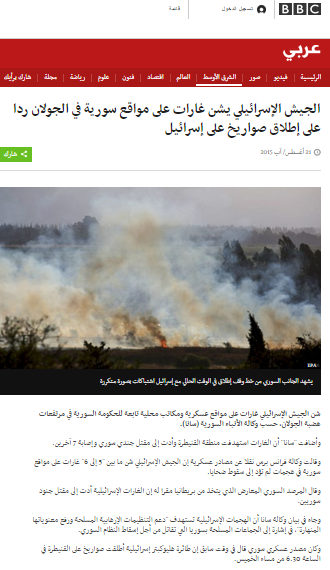Previously we have looked at some of the coverage of the death of Al Jazeera reporter Shireen Abu Akleh published on BBC News website’s ‘Middle East’ page:
BBC NEWS WEBSITE UNCRITICALLY PROMOTES AL JAZEERA CLAIMS ONCE AGAIN
BBC NEWS WEBSITE CONTINUES TO PROMOTE NARRATIVES ON ABU AKLEH DEATH
In all, ten items – the majority with Abu Akleh’s name in the headline – were published on that page over a period of six days: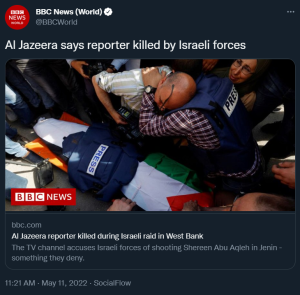
Al Jazeera reporter killed during Israeli raid in West Bank 11/5/22
Doucet: Killed Al Jazeera reporter was an ‘inspiration’ to a generation of journalists 11/5/22 Lyse Doucet
Shireen Abu Aqla: face and voice of war and peace 11/5/22 Lyse Doucet
Shireen Abu Aqla: Palestinians to refer journalist’s killing to ICC 12/5/22
Violence at Al Jazeera journalist’s funeral procession 13/5/22
Violence breaks out at Shireen Abu Aqla’s funeral in Jerusalem 13/5/22
Shireen Abu Aqla: Violence at Al Jazeera reporter’s funeral in Jerusalem 13/5/22 Raffi Berg
Shireen Abu Aqla: UN condemns killing of Al Jazeera reporter 14/5/22
Shireen Abu Aqla: NI journalists condemn killing 14/5/22
Shireen Abu Aqla: Christian leaders condemn violence at reporter’s funeral 16/5/22 Tom Bateman
In contrast, in a period of just over six weeks, the BBC News website’s ‘Middle East’ page published seven reports about terror attacks in Israel in which eighteen people died.
The first of those reports covered the March 22nd terror attack in Be’er Sheva but did not name any of the four victims.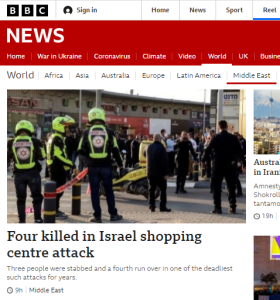
Israel: Four killed in shopping centre attack 22/3/22
A report on the March 27th terror attack in Hadera did name the two victims.
Israel: Two police killed by Israeli Arab gunmen in Hadera 27/3/22
“The two police who were killed were named as Yezen Falah – a member of Israel’s Druze community – and Shirel Abukart, both aged 19.”
The BBC’s coverage of the attack in Bnei Brak on March 29th named three of the five victims.
Five killed by Palestinian gunman in latest deadly attack in Israel 29/3/22
“Two of the victims were identified as Israeli residents of Bnei Brak – Rabbi Avishai Yehezkel, a 29-year-old father of one, and Yaakov Shalom, a 36-year-old father of five. Rabbi Yehezkel’s brother told Kol Chai radio that he was shot while taking a walk and that he “defended his baby with his own body”.
Police said the officer who died was Amir Khoury, a 32-year-old Israeli Arab from Nazareth. Police Commissioner Kobi Shabtai told his family that he was a hero who “saved the lives of many civilians”.
The Ukrainian embassy confirmed that two Ukrainian citizens were killed in what it called the “heinous terrorist attacks in Bnei Brak”. It did not give their names, but they were reportedly in their 20s and 30s.”
The BBC’s report was not updated when the names of the two Ukrainian nationals were released the following day.
A report about the April 7th terror attack in Tel Aviv identified two of the three victims.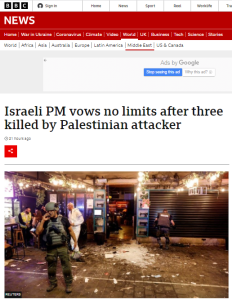
Israeli PM vows no limits after three killed by Palestinian attacker 7/4/22
“The two men killed at the bar were named as childhood friends Eytam Magini and Tomer Morad, both aged 27. A 35-year-old father-of-three, who was one of 12 people wounded, died in hospital on Friday.”
The April 29th attack in Ariel in which one Israeli civilian was murdered did not receive any coverage at all on the BBC News website.
BBC NEWS WEBSITE IGNORES FATAL TERROR ATTACK IN ARIEL
The terror attack in Elad on May 5th was the topic of three BBC reports, none of which named the three victims.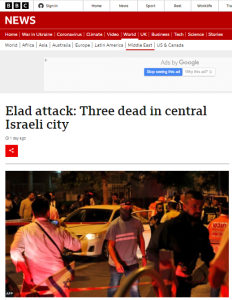
Elad attack: Three dead in central Israeli city 5/5/22
Israel hunts Palestinian axe attackers who killed three 6/5/22
“A man aged 35 and two 40-year-old men were killed. Two were fathers of five children each and the third a father of six. They were buried after a joint funeral on Friday.”
Two held in manhunt for axe attackers who killed three Israelis 8/5/22
In short, fewer than half (seven out of eighteen) the Israeli citizens and foreign nationals murdered in six terror attacks over a month and a half were identified by name in BBC reports and one of the deaths did not receive any coverage at all. Needless to say, none of those eighteen people’s names appeared in BBC headlines and none were the subject of tributes from BBC journalists.
As documented at the time (see ‘related articles’ below), none of the above coverage described the attacks against Israelis as terrorism in the BBC’s own words, in line with long-standing policy. BBC editorial guidelines concerning ‘Use of Language’ when reporting “War, Terror and Emergencies” state that:
“11.3.5 Our reporting of possible acts of terror should be timely and responsible, bearing in mind our requirement for due accuracy and impartiality. Terrorism is a difficult and emotive subject with significant political overtones and care is required in the use of language that carries value judgements. We should not use the term ‘terrorist’ without attribution.
11.3.6 The word ‘terrorist’ itself can be a barrier rather than an aid to understanding. We should convey to our audience the full consequences of the act by describing what happened. We should use words which specifically describe the perpetrator such as ‘bomber’, ‘attacker’, ‘gunman’, ‘kidnapper’, ‘insurgent’ and ‘militant’. We should not adopt other people’s language as our own; our responsibility is to remain objective and report in ways that enable our audiences to make their own assessments about who is doing what to whom.” [emphasis added]
Although the BBC balks at the use of the term “terrorist” even to describe the perpetrators of attacks on unarmed civilians, it is notably less pedantic about other language. In its coverage of the death of a journalist in a location in which a military operation against terrorists was taking place, the BBC clearly had no qualms about amplifying inflammatory and unproven allegations such as “Israeli troops “deliberately” shot her”, “crime of execution”, “blatant murder”, “assassinated in cold blood”, “targeting her with live fire”, “the “intentional targeting and killing” of a journalist” and “heinous crime”.
The copious promotion of such unproven allegations from a totalitarian state and its media mouthpiece is clearly not conducive to “due accuracy and impartiality” and did nothing to “enable our audiences to make their own assessments” about what actually happened that morning in Jenin. Both the scale and content of the BBC’s coverage of the death of Shireen Abu Alkeh demonstrate that for the BBC, the responsibility “to remain objective” is all to often a subjective matter.
Related Articles:
REVIEWING BBC COVERAGE OF THE BE’ER SHEVA TERROR ATTACK
BBC REPORTING ON HADERA TERROR ATTACK FOLLOWS THE USUAL TEMPLATE
BBC DOUBLE STANDARDS ON REPORTING TERRORISM CONTINUE
BBC’S DIZENGOFF ATTACK REPORT TIPTOES AROUND PALESTINIAN TERRORISM AND INCITEMENT
ELAD ATTACK: BBC CONTINUES TO AVOID THE WORD TERROR

